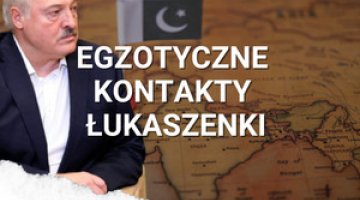Moscow is buying Minsk’s political loyalty
The most important effect of Alyaksandr Lukashenka’s visit to Moscow on 7–8 May were the negotiations which culminated in Belarus being granted further Russian economic subsidies. Not all the details of the deal are known as yet. It has, however, been revealed that, for example, a loan of US$2 billion will be granted and the sum which Minsk pays to the Russian budget annually as a share in customs duty on the re-export of petroleum products made from Russian oil will be halved in 2015. Furthermore, as Lukashenka has stated, this customs duty could be lifted entirely in the coming years. In exchange for this, Lukashenka agreed to sign an agreement establishing the Eurasian Union jointly with Russia and Kazakhstan, planned for 29 May. The support was received as a consequence of months of effort made by Minsk to receive economic benefits from Moscow in exchange for its participation in the Russian integration project and declarations of loyalty. Minsk’s stance on the conflict in Ukraine was also an element of the negotiations. Despite making gestures of support for Russia, Lukashenka recognised the new government in Kyiv and criticised the projects aimed at the federalisation of Ukraine. The benefits of Russian support for Belarus will be short-lived and will not resolve its main economic problems in the longer run, and will instead entrench Minsk's dependence on Moscow.
Belarus’s poor economic situation
Since Belarus’s economic situation is deteriorating, further Russian subsidies are of key significance. Foreign currency reserves have been depleted by over US$1 billion since the beginning of this year (the figure stood at US$5.48 billion on 1 May). The value of industrial production (-3.4%) and foreign trade (-9.5%, data for January-February 2014) fell in the first quarter of 2014. During the first three months of 2014, the inflation rate reached 4.9% (the forecast for the whole year being 11%). Therefore, the funds received will above all be earmarked for increasing the foreign currency reserves and improving the exchange rate of the Belarusian rouble, and they will thus help prevent the need to conduct a radical devaluation of the national currency, which could give rise to public unrest.
Given the deteriorating economic situation, Russia lifting the customs duty on the re-export of petroleum products made in Belarus from Russian oil has been a priority issue for the government in Minsk for a long time already. In 2013, Minsk paid US$3.3 billion to the Russian budget for these customs duties. Last year Belarus exported 13.6 million tonnes of petroleum products worth in aggregate US$10.8 billion, i.e. the equivalent of over 30% of its total exports. Lukashenka declared that Belarus would not join the Eurasian Union unless the customs duty was at least partly lifted. Talks with Russia on 29 April in Minsk during the summit of the presidents of the Customs Union member states were unsuccessful for the Belarusian government. It was announced as a result of the talks that the common market of gas, oil and petroleum products would become functional within the union “not later than” in 2025, and until that time problems linked to co-operation in the area of oil, petroleum products and gas would be settled under bilateral agreements.
The echoes of the Ukrainian-Russian conflict in Belarus
Minsk’s stance on the conflict in Ukraine was also an element of the Belarusian-Russian negotiations concerning the new subsidies. The Belarusian government was trying to stick to a policy of balancing between the two parties to the Ukrainian-Russian conflict from the very beginning. Alyaksandr Lukashenka recognised the new government in Kyiv. He also made frequent assurances of his support for the territorial integrity of Ukraine and met with Ukraine’s acting president, Oleksandr Turchynov. On the other hand, as a consequence of Russian pressure, Lukashenka admitted that Crimea is de facto part of Russia today. However, Russia’s policy towards Ukraine has been raising increasing concern among Belarusian leaders, one sign of which are a number of new elements heard in the government’s rhetoric over the past few weeks. On 22 April, during his annual address to members of parliament, Alyaksandr Lukashenka stated that keeping the country independent “by any means” and the readiness to defend it if necessary was a fundamental issue. The distinctness of Belarus and Belarusians from Russia, and the importance of the Belarusian language for Belarusian identity were also strongly emphasised. Lukashenka also made assurances that discrimination of ethnic Russians or the Russian language were out of the question, and ordered law enforcement agencies to treat any insinuations of this as acts of sabotage and to respond to them immediately. Lukashenka’s declarations mean that Minsk is becoming increasingly concerned about Moscow’s aggressive policy and will continue to eliminate any signs of activity of circles propagating ideas of integrating Belarus into Russia with even stronger intensity.
The recent developments in Ukraine have also had an impact on sentiments among the Belarusian public. According to public opinion polls conducted in March by NISEPI, a Belarusian independent research centre, President Lukashenka’s popularity increased by 5 percentage points over the past few months, reaching almost 40%. The fear of chaos and destabilisation which is felt by many Belarusians has increased the demand for a strong leader and autocratic rule. Paradoxically, despite Russia’s aggressive moves in Ukraine, the number of those who want Belarus to become integrated with the Russian Federation has increased (from 36.6% to 51.5%) and support for possible unification with Russia has grown (to 29.3% from a level of 23.9% in December 2013). These results are above all an effect of the strong impact of the Russian media on the formation of Belarusian public opinion (Russian television is the most popular source of information for many citizens of Belarus) and the fact that the Russian president is seen as a strong and determined leader by the section of the Belarusian society who hold pro-Russian views.
Conclusions: Minsk’s room for manoeuvre has got even smaller
The process of negotiating further subsidies with Moscow proves that Minsk’s room for political manoeuvre is shrinking. The Belarusian government is trying to benefit as much as possible from the new geopolitical situation in the region. On the one hand, it wants to maintain good relations with Kyiv, and has made attempts to take action to improve relations with the West. However, should the economic situation deteriorate and Russia increase the pressure, Alyaksandr Lukashenka will have to show his loyalty to Moscow. The benefits of recent support, albeit essential in the context of the presidential election scheduled for next year, will be short-lived. The oil and gas sector, which is essential for Belarus, has been excluded for many years from the planned common market of the Eurasian Union and will be regulated under bilateral agreements, which means direct dependence on Russia’s goals and current policy.





